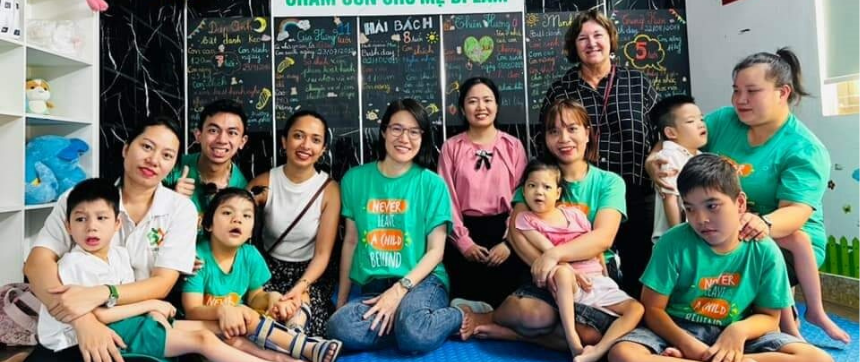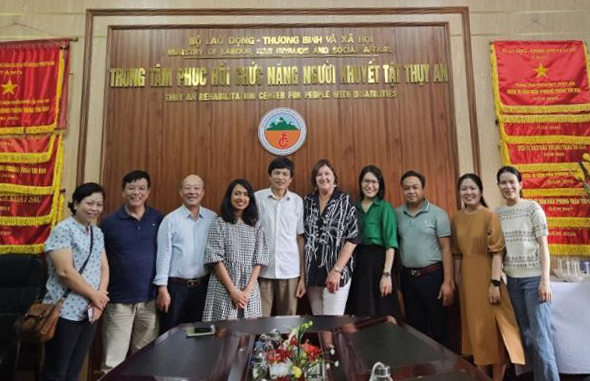 | News
| News
Leave no child behind: enhancing immunisation coverage among children with disabilities in Ba Vi, Vietnam
An ARIA-funded project is exploring ways to improve vaccination coverage rates among children with disabilities in Vietnam.
Led by Professor Elizabeth Elliott, Professor in Paediatrics and Child Health (University of Sydney), and Professor Cao Minh Chau (Phenikaa University, Vietnam), researchers from the University of Sydney and the Cerebral Palsy Alliance are working together with in-country partners in Vietnam, including a research team led by Dr Khuc Thi Hong Hanh (Phenikaa University).
Children with disabilities are particularly vulnerable to vaccine preventable diseases; however, in some countries this population group has lower vaccination coverage rates than their peers.
In the first phase of the project, the coverage and timeliness of routine and COVID-19 vaccinations in children with disabilities aged 2–17 years in Ba Vi District – a peri-urban area of Hanoi – was examined, between January and May 2024.
A total of 155 children with disabilities and their caregivers participated in the study. Participating children experienced functional difficulties including medical and sensory problems (hearing and vision) and problems with communication, motor skills, learning and cognition. The children were identified through the Thuy An Rehabilitation Centre, the Cerebral Palsy Family Association of Vietnam, the Ba Vi Association of Persons with Disabilities and the Ba Vi Department of Labor, War Invalids and Social Affairs.
The children’s immunisation status for routine Essential Programme on Immunization vaccines was established using information from immunisation cards, clinic records and caregiver surveys. Significant immunity gaps were identified.

For measles, only 59.4% of the full cohort of children assessed were fully immunised for age, while 32.3% had no record of vaccination (or their caregivers were unsure of their immunisation status). For diphtheria, tetanus and pertussis (DTP) – all serious diseases in children – just 50.3% were fully immunised; for Haemophilus influenzae type b (Hib) – a common cause of pneumonia – 58.7% were fully immunised.
Encouragingly, vaccination coverage in the younger age groups – those born between 2015 and 2022 – was higher, though still inadequate. For children aged 2–7 years, data were more reliable and immunisation status could be assessed using immunisation cards and clinic records only. For measles, 94% of this cohort were fully immunised; however, only 86.7% were fully immunised against DTP and 72.3% fully immunised against polio.
For all age groups, immunisation rates among children with disabilities – who are at heightened risk of consequences of vaccine preventable diseases – were found to be lower than in the general population.
Of 131 children aged over 5 years who were eligible for COVID-19 vaccination, 39.7% had not received any COVID-19 vaccine doses and only 7.6% had received the recommended three or more doses. Children with disabilities are at an increased risk of serious outcomes due to COVID-19.
The Immunisation Agenda 2030 and Gavi’s 5.1 strategy stress the importance of improving equitable outcomes in immunisation and ‘leaving no one behind’. Their emphasis on under-immunised and ‘zero-dose’ children, as well as ‘missed communities’, underlines the need to measure and understand vaccination coverage rates and barriers to vaccination for marginalised groups, especially in low- and middle-income countries.
Country-specific assessments of immunisation outcomes among children with disabilities – including in relation to the barriers to, and enablers of, vaccine access and uptake – can highlight disparities in vaccination coverage and inform programmatic improvements.
With those goals in mind, further qualitative research is being carried out as part of this project – with caregivers, healthcare providers, and local leaders and influencers – to explore barriers to vaccine uptake for children with disabilities in Vietnam and inform recommendations for service improvements.
This project was made possible through funding from the Australian Government to ARIA.
Banner photo: Meetings with local team members at the Cerebral Palsy Family Association of Vietnam (CPFAV), in September 2023.
